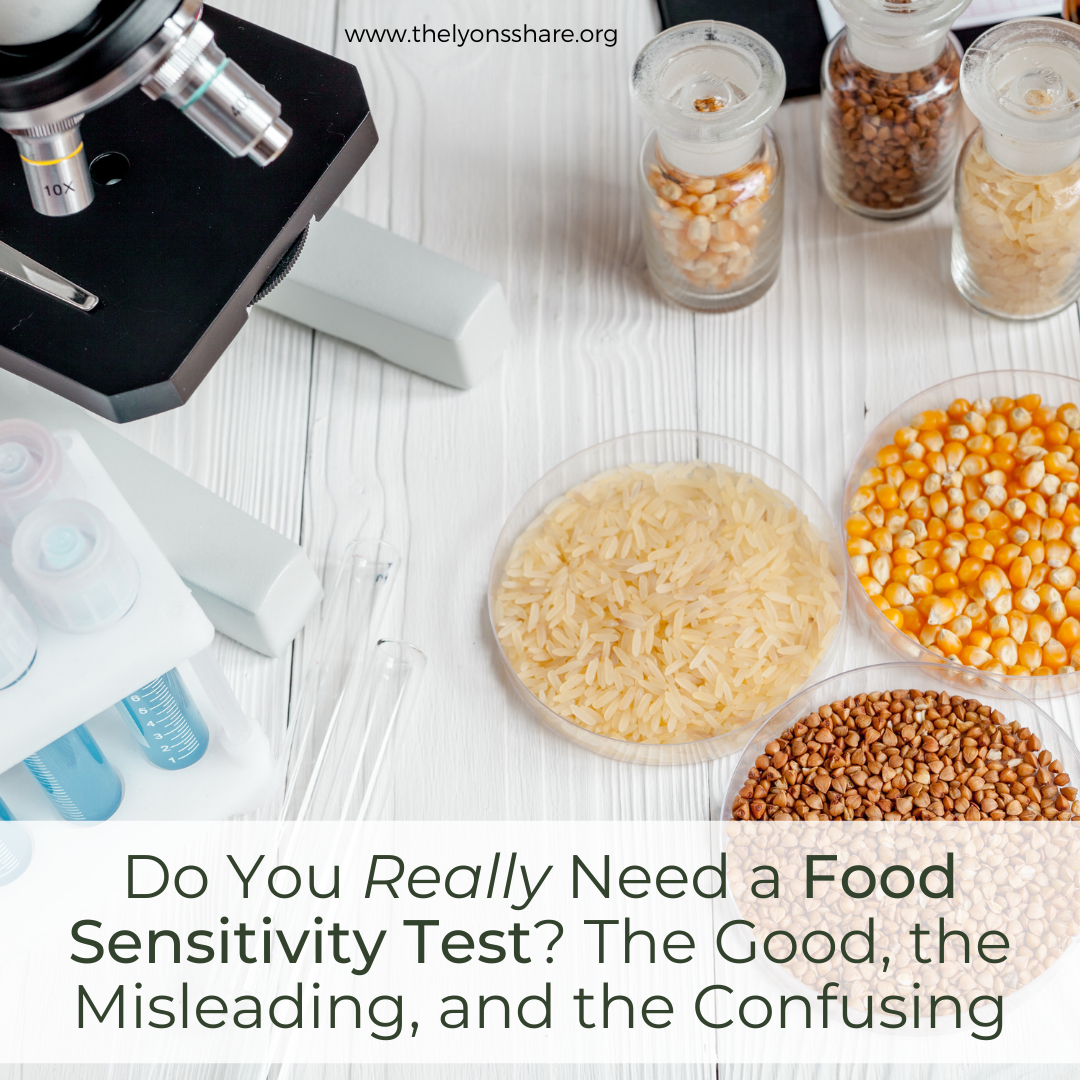One of the most common questions I hear in my practice is: “Can you just tell me which foods are good for me and which ones are bad?” And trust me when I say that I wish I could with one simple test. I also understand the pull towards this! We all crave clarity and simple answers when it comes to our health. But unfortunately, there’s no magic test that perfectly categorizes foods into “good” and “bad” for every individual (at least not yet).
Food sensitivity tests have become incredibly popular, and they do have some value. But they also come with limitations, confusion, and a lot of misleading marketing. So let’s break it down.

Food Allergies vs. Food Sensitivities
First, a quick terminology check:
- Food allergies are IgE-mediated reactions. These are immediate, potentially life-threatening responses (like hives, swelling, or anaphylaxis after eating peanuts).
- Food sensitivities are typically measured via IgG and/or IgA antibodies, and these reactions are delayed. Symptoms may appear hours or even days after eating the food, making it harder to pinpoint the cause.
Why Food Sensitivity Testing Can Be Misleading
There are several reasons why food sensitivity test results may not tell the whole story:
- Leaky Gut (Intestinal Permeability): When your gut lining is compromised, it allows larger food particles into the bloodstream. The immune system sees these as foreign and produces antibodies. The result? You test positive for dozens of foods, but the real issue is the gut, not the food. When the gut is healed, many of these sensitivities disappear. You can read more about leaky gut here to intestinal permeability post.
- Non-immune-related issues won’t show up on tests. There are many examples of these, such as:
- Histamine intolerance (caused by low DAO enzyme levels) won’t appear, but you may still react to high-histamine foods like aged cheese or wine.
- FODMAP sensitivity or IBS won’t appear, but certain fermentable carbs (like garlic, beans, apples, or cabbage) may cause bloating or gas.
- Enzyme deficiencies (e.g. low lipase or bile flow) can make fatty foods sit heavy in your digestive tract or cause diarrhea or bloating, even if there’s no immune response.
- Genetic differences play a role too. There are (obviously) too many genes to consider here, but a few examples include:
- Certain SNPs like MTHFR may impair detox pathways, making one person more sensitive to foods with chemical additives or preservatives than another.
- CYP1A2 affects caffeine metabolism.
- HLA-DQ2/8 increases risk for gluten intolerance even without celiac disease.
- The immune system is dynamic: Food sensitivity results can shift with time, stress, gut infections, or sleep quality. What you react to today may not be a long-term issue.

Is Food Sensitivity Testing Ever Helpful?
Yes, with the right expectations. Food sensitivity testing can be a valuable tool in the right context. It can:
- Help identify potential food triggers when symptoms are vague (e.g. fatigue, rashes, migraines)
- Motivate behavior change when clients feel validated by “seeing it on paper”
- Offer a starting point for people not ready to do a full elimination diet
- Provide insight for skin conditions, GI upset, chronic inflammation, and more
Why I Often Suggest Elimination Diets First
In many cases, a well-structured elimination and reintroduction diet is more accurate than a test. You get to feel the difference in your own body. Elimination diets also capture reactions that aren’t antibody-based, like histamine or FODMAP sensitivities.
But they’re not for everyone—they require time, consistency, and often guidance. If someone wants a quicker starting point, testing might still have value.
My Take as a Doctor of Clinical Nutrition
I do offer high-quality food sensitivity testing in my practice (note: be ware of the sensitivity and specificity of other direct to consumer options, which are often not great!), and for the right person, it can be helpful. But it’s not the “final answer.” It’s a piece of a larger puzzle that includes gut health, enzyme support, nervous system tone, genetics, and lifestyle.
Want to learn more about how we use food sensitivity testing alongside gut healing, nutrient repletion, and lifestyle change? Book a free initial consultation to see if our 1:1 programs are a good fit for you.
____
️ Want to hear about this topic in audio format? → Check out the podcast episode here!


0 Comments